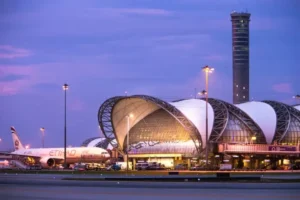 Thailand’s ambitious 2.68 trillion baht initiative aimed at radically transforming the nation’s transportation landscape
Thailand’s ambitious 2.68 trillion baht initiative aimed at radically transforming the nation’s transportation landscape
Thailand’s Ministry of Transport has unveiled an ambitious 2.68 trillion baht initiative aimed at radically transforming the nation’s transportation landscape.
The expansive project prioritises enhancing rail networks, upgrading key airports, and encouraging environmentally-friendly logistics practices, all with the goal of significantly reducing road congestion and cutting greenhouse gas emissions by 45.6 million tons by the year 2030.
This falls in line with Thailand’s obligations under the Paris Agreement, as outlined in their Nationally Determined Contributions (NDC) Action Plan for 2021–2030.
Panya Chupanich, Director of the Office of Transport and Traffic Policy and Planning, highlighted the ministry’s focus on public transport electrification. Plans are in place to introduce 3,100 electric buses on Bangkok streets by year’s end, with an additional 1,520 to follow by 2025.
Further, the ministry is set to extend Bangkok’s electric train network to 554 kilometers by September 2025. This expansion will include a simplified ticketing system with a flat fare of 20 baht per ride, making travel more affordable and seamless for commuters.
Major rail projects form the backbone of this initiative, including the expansion of double-track railways and the development of high-speed train links. Particularly noteworthy are the Bangkok–Nakhon Ratchasima high-speed rail and the three-airport high-speed rail project, which will provide streamlined connections between Don Mueang, Suvarnabhumi, and U-Tapao airports, reported NNT.
Additionally, plans to introduce light rail transit systems will be implemented in regional hubs like Chiang Mai, Khon Kaen, and Phuket, improving urban transit in these growing areas. The logistics network will benefit from significant improvements, with 4,044 kilometers of double-track rail lines already completed and an additional 1,479 kilometers slated for construction by 2029.
Source: Aseannow

